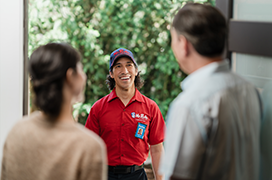Has your whole house water filtration and softener system stopped working? Do you want to install a new one? Call Mr. Rooter Plumbing® today. Our locally owned and operated plumbers work with the best water softener and filter system technology to ensure your home can access safe, healthy, contaminant-free water.
-

Water Filters
Our service professionals can repair, replace, and install whole house water filter systems so your family can enjoy clean and fresh drinking water. Our services include replacing water filters every three months and your whole home water filter every three to 10 years, as recommended.
-

Water Softeners
Mr. Rooter Plumbing® installs top-rated residential water softeners and provides quality repair and installation services. Are you looking for water softener installation professionals you can trust? Contact Mr. Rooter Plumbing® to request a job estimate today.
Find a Local Service Provider Near You
Water Softener and Filter System FAQs
Having the best whole house water filter and softener combo doesn’t mean you’ll know everything there is to know about it. Fortunately, you can always contact Mr. Rooter Plumbing® if you have questions about how residential water softener systems work or a house water filter system that isn’t working at its best.
Alongside being available to take your call 24/7, you can also read some of our more frequently asked questions below.
